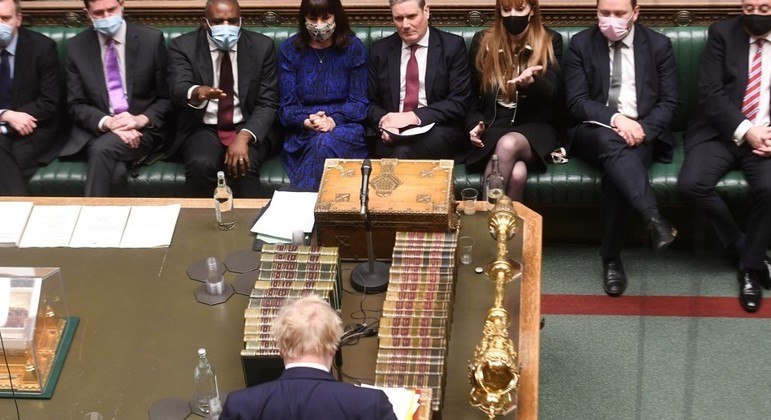British Prime Minister Boris Johnson is in the global spotlight after a string of parties during the lockdown became public and shocked Britons. The people, the press, the opposition and even the Conservative Party are putting pressure on the politician, but there are no signs of resignation.
The UK has parliamentarism as its current political system, and therefore, Johnson’s departure will not be possible through an impeachment process, as happened with Fernando Collor and Dilma Rousseff in Brazil, a presidential system.
Professor at the Institute of International Relations at the University of São Paulo (University of São Paulo) Kai Ini Liman explains that the time Johnson is counting on maintaining majority support in ParliamentEspecially the members of his party – the Conservative Party.
The Prime Minister of the United Kingdom depends on the majority of Parliament’s support to remain in office. “In English they say they have a majority in Parliament,” Lyman says.
In order to effectively change the prime minister, it would be necessary for 54 Conservative members of Congress to send letters to a member of an internal committee called the 1922 Committee. This document must contain an indication that MPs no longer trust the prime minister.
If the 54 messages reach the committee chair, an internal Conservative vote will be opened to see if, in fact, a majority of elected lawmakers no longer want Johnson as party leader in Parliament.
If the majority votes to dismiss the prime minister, then an internal election will be held within the Conservative Party to elect a new party leader in Parliament, and thus a new prime minister, with the party enjoying an absolute majority of seats in the House of Representatives.
What does the UK parliamentary elections look like?
The United Kingdom has 650 constituencies, each with one candidate from each party. Thus, the person who gets the most votes occupies one of the seats in Parliament. Lyman says most Britons vote not for the candidate, but for the party.
In fact, the vast majority of people vote for the party and not for the candidate. There are some exceptions, but in general, that’s all. You vote for the party, not the district candidate.”
In addition to the 650 parliamentarians elected to the so-called House of Representatives, there are still 792 senators who hold office through nominations – including politicians and even bishops.
Currently, the British House of Representatives consists of 363 Conservative MPs, 173 Labor and 11 other groups that complement the 650 seat holders.
Do parliamentarians exclude the president’s personality?
The answer to the above question is yes and no. Yes, if we think that the president in Brazil is the head of government and head of state, that is, he controls the main political decisions of the country, in addition to being the main image of the nation.
In most parliamentary European countries, the prime minister is seen as the head of government, with political leadership, while the president usually has ceremonial powers, as well as Queen Elizabeth II Owned in the United Kingdom.
This structure is not a rule and some countries, such as France and Poland, reflect this hierarchy of power.
We have some exceptions, we have some presidential systems, as in France and Poland, where the president, who is the head of state, has great power. In the vast majority of European cases, the head of state is ceremonial,” explains Lehmann.
The idea of the president in parliamentarism is to give continuity and prosperity to the country, being this figure that usually goes to the media to address the population.
There is still a possible third arrangement for the president and prime minister, according to the University of the South Pacific professor. “in Italia The role of the president is very important. Because there is always instability in the Italian Parliament. That is why the role of the head of negotiations is so big in this case,” concludes Lyman.



![[VÍDEO] Elton John’s final show in the UK has the crowd moving](https://www.lodivalleynews.com/wp-content/uploads/2023/06/Elton-John-1-690x600.jpg)


More Stories
Anita displays Christmas decorations in a luxury mansion in the United States
The Fast and Furious actor was arrested in the United States
[VÍDEO] Elton John’s final show in the UK has the crowd moving